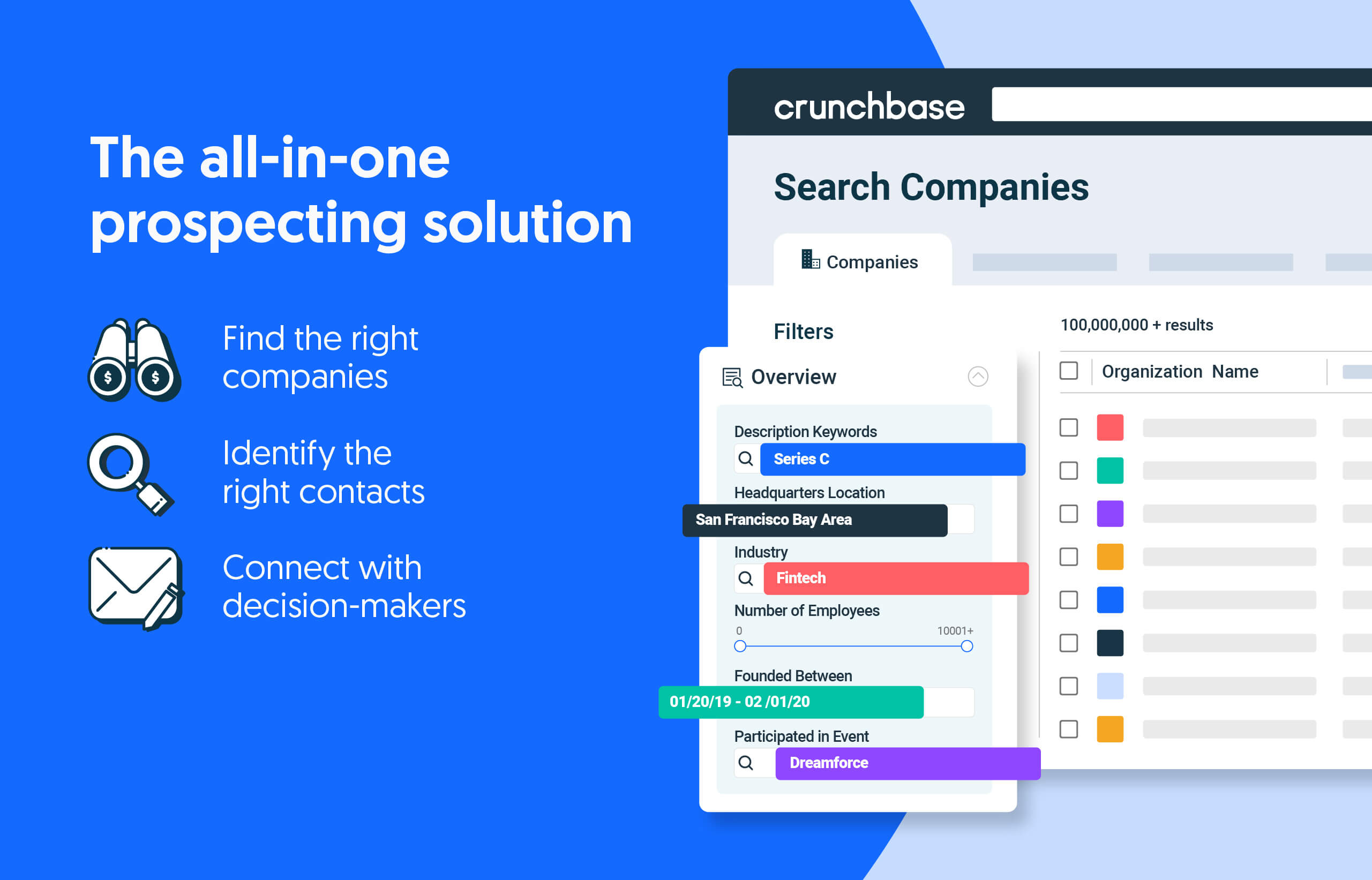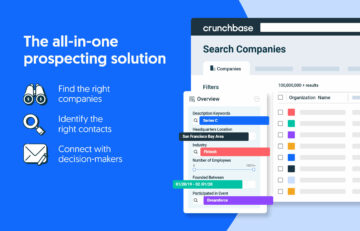In 2021 it may have seemed any startups could raise $100 million at the snap of its fingers — but the last year-plus is forcing some to find more creative ways to raise rounds and even contemplate the once taboo “down round.”
Last year ended with a slew of unicorns announcing deals that sliced into their valuations and the start of this year brought similar headlines, with reports that highly valued startups such as payments provider Stripe and online prescription delivery company Capsule are looking to raise down rounds due to market conditions.
Search less. Close more.
Grow your revenue with all-in-one prospecting solutions powered by the leader in private-company data.
As funding has become increasingly hard to secure for startups, down rounds, flat funds — fundraises at the previous round’s valuation — and other creatively structured rounds are becoming commonplace, as necessity dictates changes in the way companies raise cash.
Changing views
In the past, such rounds have been avoided, and not just because of any possible negative public relations spin. Down rounds were seen as lessening employee morale — since options can be a significant part of a startup worker’s total job offer — as well as creating dissension in the boardroom with new investors paying less for significant stakes.
“I think down rounds are becoming less stigmatized,” said Yash Patel, general partner at Telstra Ventures. “I think that’s become the new normal.
“I think if you are a startup, you have to ask, ‘What are the other alternatives?’” Patel said.
There are mainly two choices for startups right now aside from a down or flat round — venture debt or what is often referred to as a “structure” round.
Currently, venture debt providers are getting choosier as to who they lend to and there is more convenience included in the conditions of the debt — which set certain financial goals for the startup, Patel said.
The other option is a structured round, which a startup raises at a higher valuation but gives the investors liquidity preference that can be as high as 3x. This puts the investors at the front of the line to get paid out in the event of an exit at 3x the money invested.
Those deals can often leave early investors and common shareholders out in the cold with little recourse.
“I think existing inventors like the idea of a down round better since no one gets screwed,” said Patel, adding he views many structured rounds as “pernicious and predatory.”
Other investors say they never attached a stigma to down rounds, and an uptick in them helps keep them all on the same level.
“I have more respect for companies that are going to raise a down round and keep the same structure as previous ones,” said Don Butler, managing director at Thomvest Ventures. “It keeps (the cap table) cleaner.”
Down round not a death knell
Butler notes successful companies have raised down rounds and done pretty well.
Most famously, Facebook raised a down round after it raised $240 million from Microsoft in 2007. At that time, Facebook was valued at $15 billion. However, less than two years after that raise, Facebook raised $200 million at a reported $10 billion valuation — which included preferred shares.
The funding environment also has caused some companies to get creative. Butler said some startups raise what is basically an extension at the valuation of the preceding round. However, included in the deal is the ability to invest in the next round at the same valuation — locking in the price. Some deals let the company call it, while others let the investors decide whether they will invest in that succeeding round.
While not totally dissimilar from warrants or options, it is still a creative way to find financing.
Not all structured rounds are created equal, noted others.
Chris Farmer, CEO and co-founder at San Francisco-based venture firm SignalFire — which just closed on $900 million of new capital last week — said if the structured round leads to profitability or an exit it can make sense.
However, if it is just a bridge to the next round of funding, that is where trouble can start. That next round of investors will likely want to build upon the structure earlier investors already introduced and want even better terms.
In that case, Farmer said, raising a down round is logical.
“I’d rather reset the valuation to something sustainable, as a general rule,” he said.
Farmer added companies can also appease employees in a down round by doing refresh grants or creating a new strike price.
Regardless, Farmer said while many companies were able to do insider rounds last year to give them runway extensions, down rounds are certainly here as the market has shifted.
“We’ve entered a Darwinian period in the market,” he said. “There is a premium of execution over high growth right now.”
Illustration: Dom Guzman

Stay up to date with recent funding rounds, acquisitions, and more with the Crunchbase Daily.
- SEO Powered Content & PR Distribution. Get Amplified Today.
- Platoblockchain. Web3 Metaverse Intelligence. Knowledge Amplified. Access Here.
- Source: https://news.crunchbase.com/startups/down-rounds-structure-investment-stripe/
- $100 million
- 2021
- a
- ability
- Able
- acquisitions
- added
- After
- All
- all-in-one
- already
- alternatives
- and
- Announcing
- attached
- avoided
- Basically
- because
- become
- becoming
- Better
- Billion
- BRIDGE
- brought
- build
- call
- cap
- capital
- case
- Cash
- caused
- ceo
- certain
- certainly
- Changes
- choices
- Close
- closed
- Co-founder
- Common
- Companies
- company
- conditions
- convenience
- could
- cover
- created
- Creating
- Creative
- Creatively
- CrunchBase
- daily
- data
- Date
- deal
- Deals
- Death
- Debt
- delivery
- dictates
- Director
- doing
- down
- Earlier
- Early
- Employee
- employees
- entered
- Environment
- Even
- Event
- execution
- existing
- Exit
- extension
- extensions
- famously
- financial
- financing
- Find
- Firm
- flat
- For Startups
- from
- front
- funding
- funding rounds
- funds
- General
- General Partner
- get
- getting
- Give
- gives
- Goals
- going
- grants
- Growth
- Hard
- Headlines
- helps
- here
- High
- higher
- highly
- However
- HTTPS
- idea
- in
- included
- increasingly
- Insider
- introduced
- Inventors
- Invest
- invested
- Investors
- IT
- Job
- Keep
- Last
- Last Year
- leader
- Leads
- Leave
- LEND
- Level
- likely
- Line
- Liquidity
- little
- logical
- looking
- make
- managing
- Managing Director
- many
- Market
- market conditions
- million
- money
- more
- negative
- New
- next
- normal
- noted
- Notes
- offer
- ONE
- Option
- Options
- Other
- Others
- paid
- part
- partner
- past
- paying
- period
- plato
- Plato Data Intelligence
- PlatoData
- possible
- powered
- predatory
- preferred
- Premium
- prescription
- pretty
- previous
- price
- profitability
- providers
- public
- Public Relations
- Puts
- raise
- raised
- raises
- raising
- recent
- Recent Funding
- referred
- relations
- Reports
- revenue
- round
- rounds
- Rule
- runway
- Said
- same
- San
- secure
- seemed
- sense
- set
- Shareholders
- Shares
- significant
- similar
- since
- Snap
- Solutions
- some
- something
- Spin
- start
- startup
- Startups
- stay
- Still
- strike
- structure
- structured
- successful
- such
- sustainable
- table
- terms
- The
- their
- Think
- this year
- time
- to
- Total
- TOTALLY
- trouble
- unicorns
- Valuation
- valued
- venture
- views
- Warrants
- ways
- week
- What
- What is
- whether
- which
- while
- WHO
- will
- year
- years
- Your
- zephyrnet












